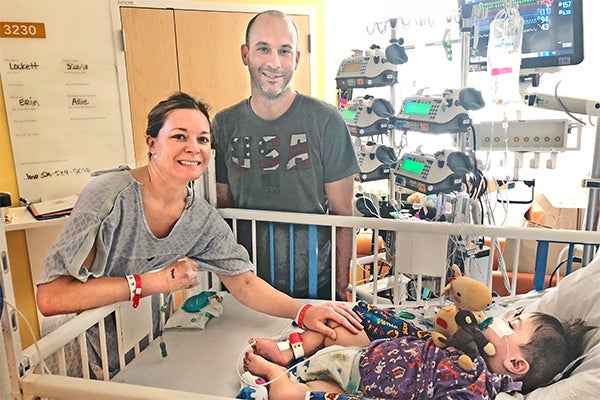March 13, 2024
With a healthy toddler named Atticus at home, Tara and Josh Schwerdt weren't nervous about expanding their family.
Halfway through Tara's second pregnancy, that sense of calm was shattered. An imaging test revealed that their baby's kidneys were not functioning correctly, but the full extent of the issue would only be known after Lockett was born.
A difficult decision
After finding their baby's kidney abnormality, the Schwerdt's healthcare team suggested terminating the pregnancy. It felt like an impossible decision to make, especially when they only just found out about the problem.
"We drove two and a half hours to get home in complete silence. We were in shock, mentally and emotionally drained," said Josh. "It was a rough few weeks as we digested the news. Then we came up with a plan."
The Schwerdts decided to continue the pregnancy. They transferred care to the number one kidney transplant in California when Tara was 32 weeks pregnant to give their baby the best chance at life after he was born.
"I was nervous about transferring our care team since it was so late in the pregnancy. Then I met the new team and felt so comfortable in their hands. We spoke with the head of nephrology and the NICU team who would care for our baby as soon as he was born. They even moved us closer to the hospital so I wasn't in danger of going into labor at home. It was the best decision we made."
It was a good thing the team brought Tara in early. Twenty-four hours later, she had a c-section, bringing Lockett into the world on October 6th.
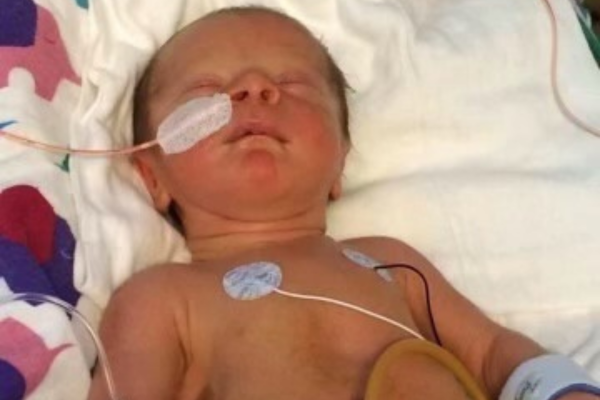
"Lockett wasn't breathing. It was terrifying but they stabilized him. Then he peed, which was a great sign that his kidneys were working. The next few days were a roller coaster. Some tests came back good. Others are bad," said Josh. "On day three, my birthday, we learned he was going to need to start dialysis and a transplant when he got older."
At five days old, Lockett got a catheter, and his parents began learning how to care for an infant on peritoneal dialysis (PD)
A rocky road ahead
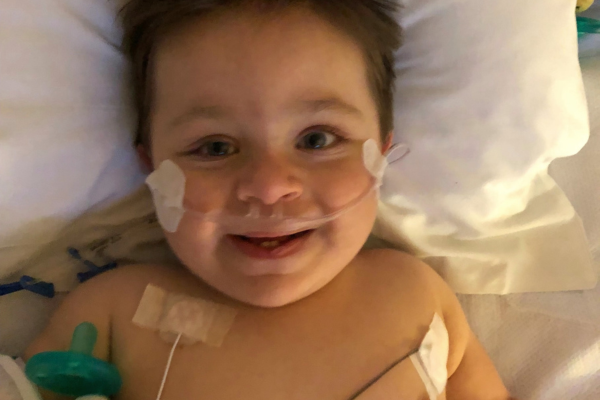
Back at home, the Schwerdts did their best to give Atticus as typical of a life as possible while caring for Lockett.
"Lockett was on dialysis for around eleven hours every single night. He was very happy but dialysis babies throw up constantly. Sleeping through the night was impossible because we had to monitor the machine and clean him up," said Tara. "I tried returning to work, but it wasn't possible with the level of care Lockett needed. The throwing up was so bad that we were in and out of the hospital."
As a result, Lockett began suffering from dehydration.
"We knew the amount he was throwing up wasn't normal and worked with his care team to come up with a solution. Previously, he was fed through a tube inserted into his nose. It tickled his throat and triggered his gag reflex," Tara said. "We switched him to a gastrostomy tube, inserted directly into his stomach, and things improved greatly."
Tara returned to work as they waited for Lockett to grow big enough for a transplant. After nine months, though, his growth drastically slowed down.
"As soon as Lockett turned a year old, he started human growth hormones. He took off," said Josh. "By fourteen months, the team was comfortable working up his living kidney donor. Since Tara and Lockett are O-positive, she was the best living donor option for him."
The National Kidney Foundation has free courses to help you on your kidney journey, no matter where you are. Join the Kidney Learning Center to find the online course that is right for you.
The path to a new normal
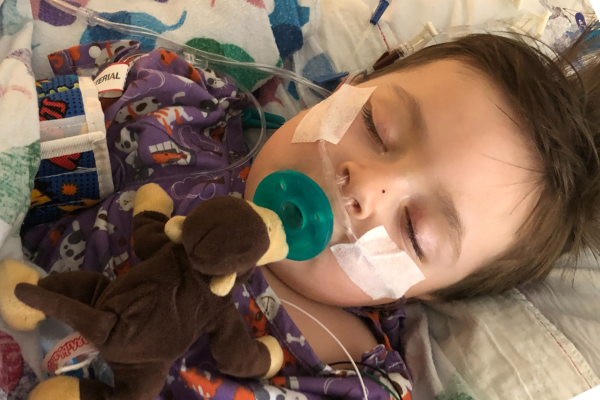
The living kidney donor evaluation took a few months, but once Tara received clearance to donate, the doctors scheduled the surgery.
"We came in early for last-minute testing, and the surgery almost didn't happen," Tara said. "I was nervous and kept forgetting to drink my clear liquids. My labs were not good, but Josh helped me get back on track. Then Lockett needed a last-minute ultrasound. It was very touch and go."
Despite the hiccups, Tara and Lockett were ready to go on their originally scheduled date.
"I was a little stressed but surprisingly at ease that day," said Josh. "We'd gone through so much with our kidney care team that I wasn't worried. I had all the trust in them."
Their trust was well-placed–the surgery went well! That didn't make recovery any easier for Tara, though.
"I thought I was prepared for the donation since I had a c-section but recovery was rough. I couldn't eat or drink because of the pain medicine," said Tara. "I was nauseous and dehydrated."
Tara was quickly discharged but returned to the hospital a few days later. After another short stay, fluids, and rest, Tara was on her way to healing.
"I spent my days at the hospital with Lockett and nights with our parents and Atticus. Josh spent the nights with Lockett. We were so lucky to have supportive family and friends that allowed us to do this."
A few weeks later, Lockett went home, but that wasn't the end of his medical journey. A transplanted kidney will reject if not properly managed.
"Lockett has to get monthly labs drawn and take medication. He will need further surgeries. His kidney may fail someday and he'll need dialysis again," said Tara. "He knows that other children don't have similar struggles. While he has great support, it's still tough."
For parents going through similar situations, Josh has a few words of wisdom:
- Be your kids' biggest advocate. Ask questions and get all the information possible before making decisions.
- Don't be afraid to seek professional support for you and your child. Ask your friends and family for help, even if just for cleaning the house or picking up food.
- Find other parents of children with chronic conditions. Having someone to talk to who understands makes a difference.
Sharing their story
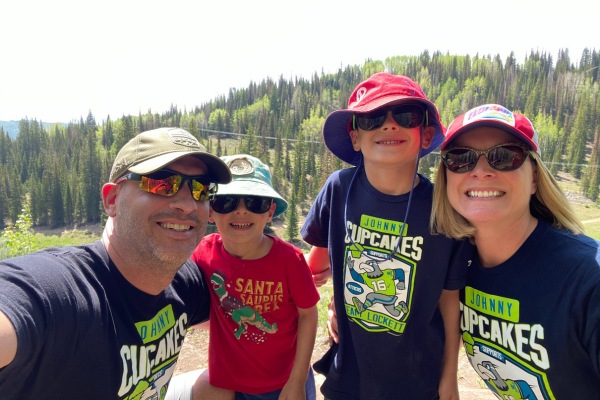
Lockett and his family have settled into a routine and are living their best lives.
"Lockett's diagnosis taught us how precious life is," Josh said. "I am so grateful for my wife and the kidney she donated. I am biased, but we have an amazing family. We are living our best life every chance we get."
The Schwerdts may have a beautiful success story, but they know that not everyone with kidney disease gets that chance. That's why they started fundraising for NKF.
"NKF is a great organization. They have so much education and provide a wonderful network of support," Tara said. "Not everyone gets the same level of care we received for Lockett. We need more people volunteering and growing the kidney community to ensure everyone gets quality kidney care and access to transplants."
"There are hundreds of thousands of people sitting on the waitlist for a kidney transplant. Out of those, 14 will die each day waiting for a kidney," said Josh. "Young, old, parents, children, siblings, aunts, and uncles—anyone can get diagnosed with kidney disease. Not everyone gets the care they deserve but we can join together to make a difference."
Whether you want to advocate for better kidney policies, spread the word about kidney disease, or fundraise, NKF has the tools to help you make a difference.
